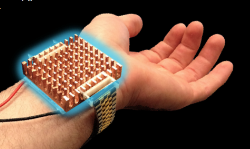#IoT: Sensors AND Actuators
Much has been said about the rapidly expanding influence of small, connected sensors in the Internet of Things.  In the book “Age of Context: Mobile, Sensors, Data and the Future of Privacy,†that I blogged about recently, “sensors” are named as one of five major forces in the “perfect storm,” the “Age of Context”.
While recognizing the importance of sensors, I also am intrigued by unique actuators, which actually do something useful in response to conditions sensed.  I learned of an interesting new application of actuators this morning in the article, “Save on utilities: just heat or cool yourself.“
Wristify … a new thermoelectric bracelet out of MIT, monitors air and skin temperature, then sends tailored pulses of hot or cold waves to the wrist to help you maintain comfortable temps.Â
This experimental device helps the body adjust to accommodate temperature changes by applying hot or cold temperatures to the body through a wrist band:
If I put something cold directly on your body at a constant temperature, the body acclimates and no longer perceives it as cold. … Think of what happens when you jump in a lake. At first, it’s bracingly cold, but after a while, you get used to it. By continually introducing that sudden jolt of cold, Shames discovered, you could essentially trick the body into feeling cold. Wristify basically makes you feel like you’re continually jumping into the lake — or submerging into a hot bath.
This seems like a great use of sensors teamed with actuators, transforming contextual knowledge (ambient temperature) into useful response (thermal comfort).
Will we soon see a wearable device to help us endure to or cold temperatures? I don’t know, but this could be really useful. Apple or Google, could you please build this into a smart watch?

